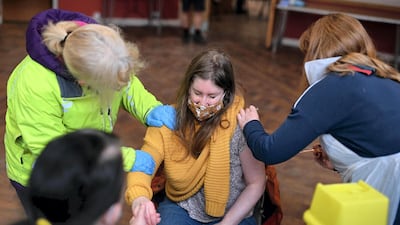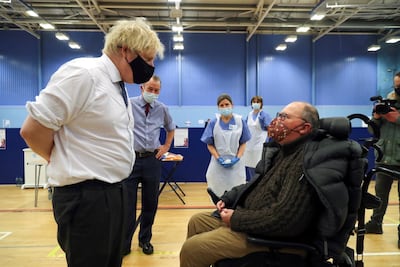Britain will consider whether vaccine certificates are needed to reopen parts of the economy, Prime Minister Boris Johnson said on Monday.
Mr Johnson said a review committee would report back on June 21 as to whether “Covid status certification” could help to reopen venues closed by coronavirus restrictions.
This would involve allowing people who have received a vaccine or returned a negative test to do things that would not be possible for those who could not prove their status.
The review was among others including a study on how long social distancing and face masks would be needed, an investigation into international travel, and the safe return of major events.
Vaccine certificates or passports for use domestically have been resisted by government ministers who have fears of discrimination and a possible increase in people hesitant to take the vaccine.
The Covid-19 vaccine is provided for free in the UK but it is not mandatory to take it.
The government is in talks with other countries including Greece on whether to set up a system of vaccine passports to allow international travel to resume.
Announcing his plan for easing lockdown, Mr Johnson said international travel would be banned until May 17 at the earliest, prolonging the pain for airlines, airports and holiday companies.
The review of travel will provide recommendations on how international travel should resume, while managing the risks of new variants of coronavirus. It will report on April 12.
The government’s roadmap for easing lockdown depends on four key conditions being met at each stage.
The tests include:
Vaccine distribution
The country’s Covid-19 vaccination campaign, a success so far, must continue to progress.
Mr Johnson said on Sunday that all adults in the UK aged over 50 would be offered a vaccine by April 15 and all adults by the end of July.
More than 17 million people in Britain are inoculated, with more than 1,500 vaccine sites in operation.
Vaccine efficacy
Evidence must show that vaccines are effective in reducing hospital admissions and deaths.
The recent decline of both appears to be accelerating in older people, but there is uncertainty over whether this is mainly due to the effects of lockdown or vaccination.
However, Vaccine Minister Nadhim Zahawi said the inoculation campaign was “starting to bear fruit” in terms of hospital admissions and deaths.
"Public Health England have been running a couple of large-scale studies," Mr Zahawi told Sky News.
He spoke of the Siren study, which tested frontline healthcare staff who were given priority early in the vaccination campaign, and Vivaldi, which focused on care home residents who were also among those inoculated first.
“Suffice to say the evidence looks good," Mr Zahawi said.
The prime minister is expected to give more details today.
Prof Neil Ferguson, a key scientific adviser to the government, suggested last week that vaccines had led to a two-thirds reduction in virus transmission.
“There are two factors we have to look at: one is how quickly our infection levels are declining, in particular how quickly hospital admissions and deaths are declining," Prof Ferguson said.
"The second is the picture of the real world effectiveness of vaccines. They are both looking promising at the moment.”
Prof Adam Finn from the University of Bristol said: “Everything is moving in the right direction”.
“We’ve got to the point in our study in Bristol to say vaccines are definitely having an effect – it’s just hard to put an exact number on it at the moment,” Prof Finn said.
Infection rates
Coronavirus infection rates must be suppressed to prevent hospitals from being overwhelmed by new admissions.
In January, the UK moved to its highest Covid alert of level five, which warned that the health service was in danger of being overwhelmed within 21 days.
The situation has since improved but the number of Covid-19 patients in hospital remains higher than during the peak of the first wave last spring.
Data from February 14 revealed the average daily number of people admitted to hospital with coronavirus was 1,500. That number was 4,134 at the peak of the third wave on January 12.
NHS England chief executive Sir Simon Stevens said that there were "early signs" that the vaccine campaign was contributing to the fall in Covid-19 hospital admissions.
New variants
Government guidance suggests that re-emerging from lockdown is feasible only when scientists decide that new variants are not a threat to vaccine efficacy.
Last year, the Kent variant caused a surge in the infection rate, throwing government plans for families to reunite over Christmas into disarray.
Evidence suggests that vaccines continue to offer protection against the UK strain, but there is uncertainty over the South African variant and the strain first identified in Brazil.
Health Secretary Matt Hancock said the UK must be wary of new strains.
"We've got to be vigilant because if one of these new variants doesn't respond to the vaccine, as well as the variant that is now the standard variant in the UK – the Kent variant – then that's obviously a very serious risk for the vaccination programme,” Mr Hancock said.
"We're doing a lot of work to find out the impact of the vaccine on these new variants, especially the ones discovered in Brazil and South Africa, because clearly knowing the answer to that question is critical to understanding how much of a risk the new variants pose."


